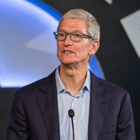Starbucks Corporation is an American multinational chain of coffeehouses and roastery reserves headquartered in Seattle, Washington. As the world's largest coffeehouse chain, Starbucks is seen to be the main representation of the United States' second wave of coffee culture. Since the 2000s, third wave coffee makers have targeted quality-minded coffee drinkers with hand-made coffee based on lighter roasts, while Starbucks nowadays uses automatic espresso machines for efficiency. As of early 2020, the company operates over 30,000 locations worldwide in more than 70 countries. Starbucks locations serve hot and cold drinks, whole-bean coffee, microground instant coffee known as VIA, espresso, caffe latte, full- and loose-leaf teas including Teavana tea products, Evolution Fresh juices, Frappuccino beverages, La Boulange pastries, and snacks including items such as chips and crackers; some offerings (including their annual fall launch of the Pumpkin Spice Latte) are seasonal or specific to the locality of the store. Headquartered in the Starbucks Center, the company was founded in 1971 by Jerry Baldwin, Zev Siegl, and Gordon Bowker at Seattle's Pike Place Market. During the early 1980s, they sold the company to Howard Schultz who – after a business trip to Milan, Italy – decided to make the coffee bean store a coffeeshop serving espresso-based drinks. Schultz's first tenure as chief executive, from 1986 to 2000, led to an aggressive expansion of the franchise, first in Seattle, then across the U.S. West Coast. Despite an initial economic downturn with its expansion into the Midwest and British Columbia, the company experienced revitalized prosperity with its entry into California in the early 1990s through a series of highly publicized coffee wars. Schultz was succeeded by Orin Smith who ran the company for five years, positioning Starbucks as a large player in fair trade coffee and increasing sales to $5 billion. Jim Donald served as chief executive from 2005 to 2008, orchestrating a large-scale earnings expansion. Schultz returned as CEO in the middle of the 2008 financial crisis and spent the succeeding decade growing its market share, expanding its offerings, and reorienting itself around corporate social responsibility. Kevin Johnson took over from Schultz in 2017, and continues to serve as the firm's chief executive. Many stores sell pre-packaged food items, hot and cold sandwiches, and drinkware including mugs and tumblers; select "Starbucks Evenings" locations offer beer, wine, and appetizers. Starbucks-brand coffee, ice cream, and bottled cold coffee drinks are also sold at grocery stores. In 2010, the company began its Starbucks Reserve program for single-origin coffees and high-end coffee shops. Starbucks operates six roasteries with tasting rooms and 43 coffee bars as part of the program. The latest roastery location opened on Chicago's Magnificent Mile in November 2019; it is the world's largest Starbucks. The company has received significant and sustained criticism about its business practices, corporate affairs, and role in society. Conversely, its franchise has commanded substantial brand loyalty, market share, and company value.




